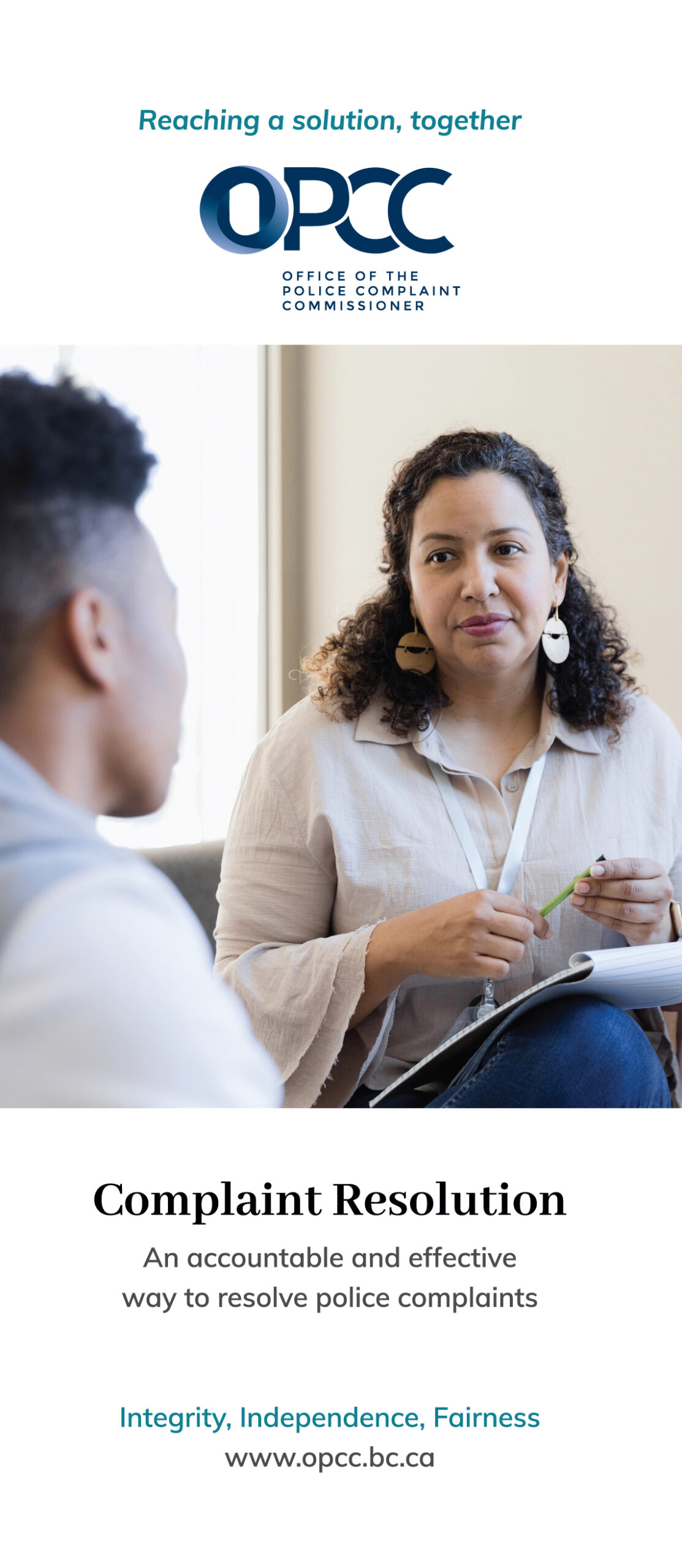Complaint Resolution & Mediation
What is Complaint Resolution?
Complaint Resolution is an alternative dispute resolution method for resolving municipal police complaints. It is different than the formal investigation process. Complaint Resolution gives you and the involved police officer an opportunity to come to a mutual agreement or a solution. If you are not able to agree, it goes back to the formal investigation process.
Benefits
This process is an accountable and effective way to resolve police complaints. The Complaint Resolution process benefits complainants and police officers. Both have an opportunity to share their perspectives and find common ground to resolve the incident.
Some advantages include:
- direct input to resolving your complaint.
- sharing your perspectives, concerns, and details of the impact on you.
- asking questions to get more information.
- quicker resolution of your complaint.
- complete confidentiality.
- can incorporate culturally relevant practices or protocols.
Many complainants say that participating in Complaint Resolution is more satisfying. They get to have a direct impact on the outcome that reflects their concerns. You can read more about people’s experiences participating in the Complaint Resolution process in our Annual Reports.
What complainants say about Complaint Resolution
- The process was easy.
- They felt understood.
- They achieved positive outcomes.
Complaint Resolution enhances community policing by improving the relationship between the public and the police, one relationship at a time. Successful resolutions can have a positive impact on the participants’ families, friends, and the community.
Process
Complaint Resolution is done with the help of a facilitator, usually a trained senior member of the police department, who will help the parties reach a resolution. Complaint Resolution is suitable for complaints that are less serious in nature and contain less complicated issues.
Both the complainant and the officer must agree to participate in the Complaint Resolution process. Both must also agree in writing to the proposed resolution, including the specific terms of the agreement. For example, the agreement may be that the complainant receives a written apology from the officer, or that the officer participates in some training. You do not have to meet or speak directly with the officer involved.
Either party may withdraw consent. If consent is withdrawn or if the Police Complaint Commissioner decides the terms are not in the best interest of the public, the complaint will continue to be investigated under a formal investigation.
Go to Make a Complaint for information and forms. Our guide on the Complaint Process shows you all the steps a complaint goes through once filed.
Mediation
Mediation is another alternative dispute resolution process, different from a Formal Investigation. It is a way to resolve disputes where a professionally trained mediator helps those involved find a mutually satisfying resolution.
The Police Complaint Commissioner first reviews the complaint and determines whether Mediation is appropriate. If it is chosen, the process begins.
Mediation takes place in a neutral environment. It is confidential, including all communications and the final resolution, encouraging open and honest discussions.
Here is how it works:
- The mediator arranges a date and place to meet, convenient for all involved. The process is flexible and the wishes of both parties are accommodated.
- Both the complainant and the officer have the opportunity to give their views on the incident leading to the complaint. The mediator helps participants work on an agreement to resolve the complaint.
- When both parties are satisfied, the mediation agreement is signed.
If the mediation fails to come to an agreement, the complaint will return to the Formal Investigation process.
Guidelines
Complaint Resolution is a very important component of the police complaint system. The Police Complaint Commissioner has created Guidelines in this area to ensure that complaints which meet the criteria for this process are assessed at an early stage and outline the appropriate steps to be taken to successfully resolve a complaint.
Complaint Resolution Brochure
Other Languages
- Punjabi – ਕਮਪਲੇਂਟ ਰੈਜ਼ੋਲੂਸ਼ਨ (ਸ਼ਿਕਾਇਤਾਂ ਦੇ ਹੱਲ) ਬਾਰੇ ਬਰੋਸ਼ਰ
- Simplified Chinese – 投诉和解手册
- Traditional Chinese – 投訴排解小冊子




